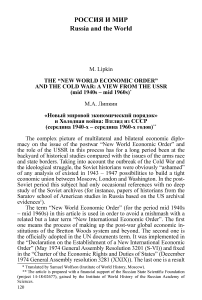The “new world economic order” and the cold war: a view from the USSR (mid 1940's - mid 1960's)
Автор: M. Lipkin
Журнал: Новый исторический вестник @nivestnik
Рубрика: Российская повседневность
Статья в выпуске: 50, 2016 года.
Бесплатный доступ
The article examines the issue of the USSR’s participation / non-participation in building a new system of the world economic order after World War II with the participation of other key countries of the Western world based on the unpublished documents of two Russian archives - WUA Ministry of Foreign Affairs of the Russian Federation and RGANI. The nuances of Soviet diplomacy are discussed in detail at a conference in Bretton Woods; for the first time, the chronology of key discussions of the Soviet side is built. The author shows that the temporary refusal of the USSR to sign the Bretton Woods agreements did not mean a final refusal of economic cooperation with the West. Soviet experts discussed this topic until the beginning of 1947. The fundamentally new thesis is that in 1965 the USSR again received an invitation to take part in the Asian Development Bank, a transregional organization with global participation. However, the geopolitical situation in Southeast Asia did not allow entering through the bank into the system of the Bretton Woods institutions from the back door. The author comes to the conclusion that even without entering the official Bretton Woods institutions, the USSR influenced the world economy, influencing the Third World countries and participating in the development of the institutions of the New International Economic Order of the 1960s – 1970s, such as United Nations Conference on Trade and Development (UNCTAD).
Короткий адрес: https://sciup.org/14913871
IDR: 14913871
Список литературы The “new world economic order” and the cold war: a view from the USSR (mid 1940's - mid 1960's)
- Шенин С.Ю. Американская программа «пункта-4»: 1949 -1953. Саратов, 2000; Батюк В.И., Евстафьев Д.Г. Первые заморозки: Советско-американские отношения в 1945 -1950 гг. М., 1995.
- Garavini G. After Empires: European Integration, Decolonization and the Challenge from the Global South, 1957 -1986. Oxford, 2012;
- Burke R. Decolonization and the Evolution of the International Human Rights. Philadelphia, 2012.
- Archive of External Policy of the Ministry of Foreign Relations of the Russian Federation (AVP RF). F. 06. Op. 6. P. 17. D. 170. L. 40.
- Попов В.П. Экономическая политика Cоветского государства. М.; Тамбов, 2000. С. 80.
- Батюк В.И., Евстафьев Д.Г. Первые заморозки: Советско-американские отношения в 1945 -1950 гг. М., 1995. С. 20-22.
- Павлов М.Ю. Анастас Микоян: Политический портрет на фоне советской эпохи. M., 2010. С. 228, 229.
- Lipkin M. Avril 1952, la conférence économique de Moscou: Changement de tactique ou innovation dans la politique extérieure stalinienne?//Relations internationals (P.U.F.). 2011/3. № 147. P. 19-33.
- The National Archives (UK) (TNA). T229/871.Treasury. Central economic planning staff. Proposed World Economic Conference arising out of the Geneva discussions (1955). Draft Brief Geneva Conference: should there be a World Economic Conference? G. van Loo, 1st July 1955.
- Женевское совещание глав правительств четырех держав -СССР, Великобритании, США и Франции (18 -23 июля 1955 г.): Документы и протоколы. М., 1955. С. 30-33.
- Липкин М.А. Советский Союз и европейская интеграция: середина 1940-х -середина 1960-х годов. М., 2011. С. 212, 213.
- Russian State Archive of Contemporary History (RGANI). F. 3. Op. 16. D. 805. L. 64.
- RGANI. F. 3. Op. 18. D. 816. L. 79.
- Липкин М.А. Европейская интеграция и советские экономические инициативы (1950-е -первая половина 1970-х годов): По новым материалам российских и зарубежных архивов//Новая и новейшая история. 2009. № 3. С. 47-64.
- Валлерстайн И. Анализ Мировых Систем и ситуация в современном мире. СПб., 2001. С. 13, 14.
- Липкин М.А. Глобальное прочтение истории СССР: Дискуссии вокруг «Красной глобализации» Оскара Санчеса-Сибони//Российская история. 2016. № 1. С. 131-144.


